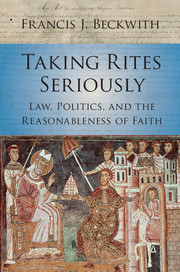Book contents
- Frontmatter
- Dedication
- Contents
- Acknowledgments
- 1 Introduction: Faith Seeking Understanding
- Part I Reason and Motive
- Part II Dignity and Personhood
- Part III Nature and Sex
- 6 How to Be an Anti–Intelligent Design Advocate: Science, Religion, and the Problem of Intelligent Design
- 7 Same-Sex Marriage and Justificatory Liberalism: Religious Liberty, Comprehensive Doctrines, and Public Life
- 8 Conclusion: Taking Rites Seriously
- Index
8 - Conclusion: Taking Rites Seriously
from Part III - Nature and Sex
Published online by Cambridge University Press: 05 November 2015
- Frontmatter
- Dedication
- Contents
- Acknowledgments
- 1 Introduction: Faith Seeking Understanding
- Part I Reason and Motive
- Part II Dignity and Personhood
- Part III Nature and Sex
- 6 How to Be an Anti–Intelligent Design Advocate: Science, Religion, and the Problem of Intelligent Design
- 7 Same-Sex Marriage and Justificatory Liberalism: Religious Liberty, Comprehensive Doctrines, and Public Life
- 8 Conclusion: Taking Rites Seriously
- Index
Summary
There is, of course, a perfectly good and indispensible sense in which … [the] language [of the separation of church and state] has application and should be zealously upheld. That is the sense of the First Amendment of the Constitution of the United States. But in general usage today, what it really means is that what religion teaches is not a matter of knowledge of reality. It is, rather, only a matter of what certain human groups have accepted as a part of their historical identity, and what (it is assumed) they are all too glad to force upon other groups and individuals as opportunity offers. If it were seriously imagined that the teachings of Christianity or other religions constituted a vital and irreplaceable knowledge of reality, there would be no more talk of the separation of church and state than there is of the separation of chemistry or economics and state.
Dallas Willard (1935–2013)Imagine that you are watching on television a hearing of the U.S. Senate Judiciary Committee. Each of its members is asking questions of, and in some cases interrogating, the president's most recent nominee to the U.S. Supreme Court. She is an accomplished attorney with not only a law degree from an elite institution but holds a doctorate in biochemistry and had specialized in private practice on issues over which science and law overlap and intersect. For several years she had served on the federal bench on the DC circuit and had done so admirably, showing professional competence and jurisprudential insight that had become the envy of her peers, some of whom disagree with her conservative judicial philosophy. Over the years she has published well-received articles in numerous law reviews and peer-reviewed science publications dealing with issues as wide ranging as the Daubert standard, the reliability of DNA testing in capital murder cases, and whether the Supreme Court's holdings in its reproductive rights cases provide support for a Constitutional right to clone oneself.
She is also a devout Catholic and has published several law review articles critical of the Supreme Court's reproductive rights jurisprudence, and in particular the Court's reluctance to make an argument on either the question of when human life begins or the moral status of that life when in fact it does begin.
- Type
- Chapter
- Information
- Taking Rites SeriouslyLaw, Politics, and the Reasonableness of Faith, pp. 210 - 218Publisher: Cambridge University PressPrint publication year: 2015



